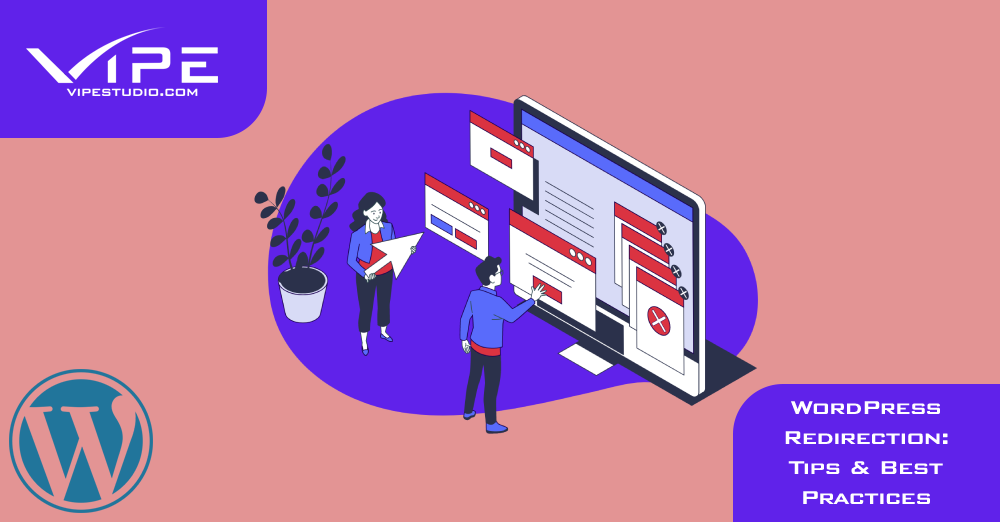21.01.2023
WordPress Development
WordPress Redirection: Tips & Best Practices
READING TIME: MIN
Table of Content
As a WordPress developer, you must be familiar with WordPress redirection. Many of our clients from our Enterprise WordPress Agency for Development are also wondering how we can perform this redirection smoothly and safely.
When this redirection process is done perfectly, it can be used to replace older and also less useful information easily. It can be used to avoid getting undesirable 404 errors, especially after you delete any outdated materials.
There are several things that you need to know about this process. You can also call our experts at our Enterprise WordPress Agency for Development when you want to know how to redirect any pages or posts in your WordPress safely. Here are some of the best practices that you can do now.

1. Redirect WordPress to Relevant Pages
Our Enterprise WordPress Agency for Development believes this is one of the best tips that you can follow now. In order to avoid getting 404 problems when you are deleting or relocating content, you can use this tip for your website.
You need to understand that a higher bounce rate will bring a negative impact on your SEO and your website performance. You can also have reduced or less traffic coming to your website when you have too many 404 or broken pages on the website.
It will be a good idea for you to redirect your traffic to the relevant pages, so you can let your readers know about your interest and the niche of your website.

2. Use 301 Redirects
There are several types of redirects that you can find on the Internet today. However, we usually recommend the use of 301 redirects to our clients from our Enterprise WordPress Agency for Development.
It will indicate that the page is still in the same location for the foreseeable future, but it will indicate a permanent page move. By doing this 301 redirect method, you can also reduce the risk of getting banned on the search engines (Google) for having duplicate materials on your website.

3. Check if the Redirects Can Work Perfectly
After you set up the redirect from your website, our Enterprise WordPress Agency for Development reminds you that you need to check if it can work correctly. You can simply type in your old URL to the web browser.
If the redirection process works perfectly, WordPress will bring you to the correct destination page. If not, you may want to take a look at the .htaccess file or your own Redirection plugin to look for any mistakes.
You need to ensure that all redirections can work well, in order to avoid getting any other problems in the future. If you want to monitor your links, you can also use the Link Monitor feature from ManageWP.

4. Keep All Redirects Tidy and Neat
This is another useful tip that you can follow, especially when you want to have a functional WordPress redirection process. When your number of redirects increases from time to time, they may be hard to navigate.
It will be difficult for you to track any redirect chain and also the old redirects. Therefore, you need to manage all of these redirect links, in order to keep everything organized. Our experts from our Enterprise WordPress Agency for Development can recommend you use the Redirection plugin. This type of plugin can help you keep all of the redirects neat and tidy.
It will be useful to help you manage the links to your WordPress website easily. You can also manage them by sorting them into groups. We recommend you categorize your redirects, so you can navigate to the relevant group at any time you want.

Follow the Best Redirection Practices to Ensure the Smooth Performance of Your WordPress Website!
Redirection is the most invaluable process that can be used to ensure that all visitors can get the content that they want. When this process is done correctly, it can help you present live content, instead of showing 404 errors.
Therefore, it can be used to provide a better user experience for all of your visitors. The right WordPress redirection process can also help you retain the page rank, so you can maintain the performance of the SEO campaign of your website.
If you need some help in doing the best redirection process, you can always call our experts at our Enterprise WordPress Agency for Development to help you with your website.
More on The Topic
- Navigating WooCommerce Performance: Real-World Strategies
- The Role of AI in WordPress Development Workflows
- Optimizing WordPress for Enterprise: Beyond Basic Caching
- WordPress and Headless Commerce: A Provocative Dilemma
- Decoupled WordPress Architecture: The Future or a Fad?
Tags: redirectredirectiontips and trickswordpress tips
The content of this website is copyrighted and protected by Creative Commons 4.0.



